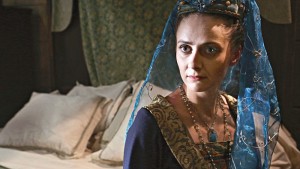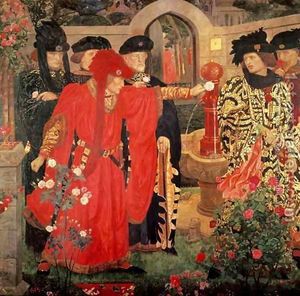Mother-in-laws. Who’d have ‘em – am I right? (Actually mine’s very nice, so yes I would).
They’re the butt of the joke of countless comedians – and that’s hardly a modern phenomenon. Perhaps it’s no wonder then, that as we trawl through the records of history, we assume that it’s always been the case.
Nowhere does this assumption seem to let us down more than when we talk of the relationship between Elizabeth of York and her legendary mother-in-law, Margaret Beaufort. In fact countless blog post on the internet and many history books, tell of infamous conflict between the two Tudor matriarchs and accounts of bullying and dominance by the elder to the younger.
However, there’s little evidence to support it. Most of it, I understand, comes from the report of a foreign ambassador who noted that Margaret dominated her daughter-in-law but, others have argued it is ridiculous to judge their entire relationship based on one comment from an outsider. Alison Weir also suggests that this particular incident may have been the result of Margaret feeling over-protective of Elizabeth, believing her to be pregnant.
Besides which, there are several indications that the two women got on well.
- When Elizabeth’s daughter and Margaret’s name sake, Margaret Tudor, was pledged in marriage to the much older King of Spain, both women were worried that the teenage girl would be ‘harmed’ by her husband who ‘would not wait.’ Clearly Elizabeth was motivated by maternal concern and Margaret by her own bitter experience of the medieval marriage market. The records show that grandmother and mother teamed up to save the young Princess and thanks to their combined efforts Henry VII listened.
- Similarly, there is evidence that when Elizabeth’s younger sister, Cecily of York, fell from the King’s favour following an unauthorised second marriage, it was Margaret who interceded for her. Whether this was out of direct affection for Cecily or in partnership with Elizabeth is not certain but, it is hardly an act of a woman who despised her Yorkist in-laws.
- They spend an awful lot of time in each other’s company. This of course, may have been unavoidable but, it seems unlikely that two powerful woman who hated each other couldn’t have worked harder to ensure a greater distance.
Other arguments peruse that Margaret only walked one step behind Elizabeth, that Henry’s mother had Elizabeth’s banished, yet none of them are as illuminating as people might like. When researching this topic I came across an interview with author Amy Licence, who I think puts it better than I ever could:
“If Elizabeth did find her [Margaret] at all “overbearing”- and this is a modern reaction- she may well have accepted that, as it was balanced by the assistance Margaret was able to offer. Having an experienced older woman at her side, particularly when she was pregnant or in Henry’s absence, may well have been reassuring. As for being “close,” again, this is subjective and perhaps, a bit of a misnomer; in terms of the late medieval impulse for survival and the need to forge alliances, Elizabeth and Margaret found a sort of equilibrium that allowed them to be allies. I think their mutual interest bound them together.”
The personal feelings of the two women are unknown to us and, as stated above, that is not the paradigm which would have shaped their thinking. Ultimately both had made the decision to throw all their resources, not to mention their respective claims to the throne, fully behind project Tudor. They were both wise enough to know that any other considerations had to be left at the chamber door.
What do you think geeks? Have I missed any evidence? Am I too flattering to the characters of both women? Was Margaret actually the mother-in-law from Hell? I want to know what YOU think!





